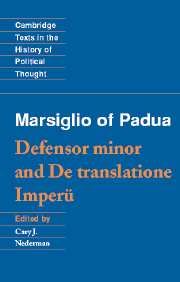Book contents
- Frontmatter
- Contents
- Acknowledgements
- Editor's introduction
- Note on texts and translations
- Bibliographical note
- Principal events in the life of Marsiglio of Padua
- Defensor minor
- De translatione Imperii
- Table of biblical citations
- Index of proper names
- Index of subjects
- CAMBRIDGE TEXTS IN THE HISTORY OF POLITICAL THOUGHT
Defensor minor
Published online by Cambridge University Press: 05 June 2012
- Frontmatter
- Contents
- Acknowledgements
- Editor's introduction
- Note on texts and translations
- Bibliographical note
- Principal events in the life of Marsiglio of Padua
- Defensor minor
- De translatione Imperii
- Table of biblical citations
- Index of proper names
- Index of subjects
- CAMBRIDGE TEXTS IN THE HISTORY OF POLITICAL THOUGHT
Summary
The beginning of the book entitled Defensor minor, edited by Master Marsiglio of Padua after the Defensor pacis major.
Chapter 1
[1] We have previously read in earlier works, according to the claims of the Master of the ‘Sentences’ [Peter Lombard], that priests have a certain power of binding and also of loosing, namely, of excommunicating sinners and cutting them off from spiritual as well as civil or temporal association [communicatio] and from fellowship with others of the faithful – powers which they call ‘jurisdiction’. It seems at least appropriate to examine what this jurisdiction is and how many types of it may be identified, and whether, according to any sense of the term, the jurisdiction of the emperor is due to bishops or priests.
[2] Just as the word indicates, therefore, ‘jurisdiction’ is the pronouncement of right [dictio iuris]; moreover, right is the same as law. Indeed, law is two-fold: it is sometimes divine, sometimes human. And taking law in its ultimate and proper meaning, as is written in Defensor pacis, Discourse 1, chapter 10, divine law is the immediate precept of God without human deliberation regarding voluntary human acts committed or omitted in the present world towards the best end or condition in the future world which human beings are suited to pursue. These are coercive precepts, I say, for transgressors in this world, under punishment or torment to be carried out in the future rather than the present world.
- Type
- Chapter
- Information
- Publisher: Cambridge University PressPrint publication year: 1993
- 1
- Cited by



